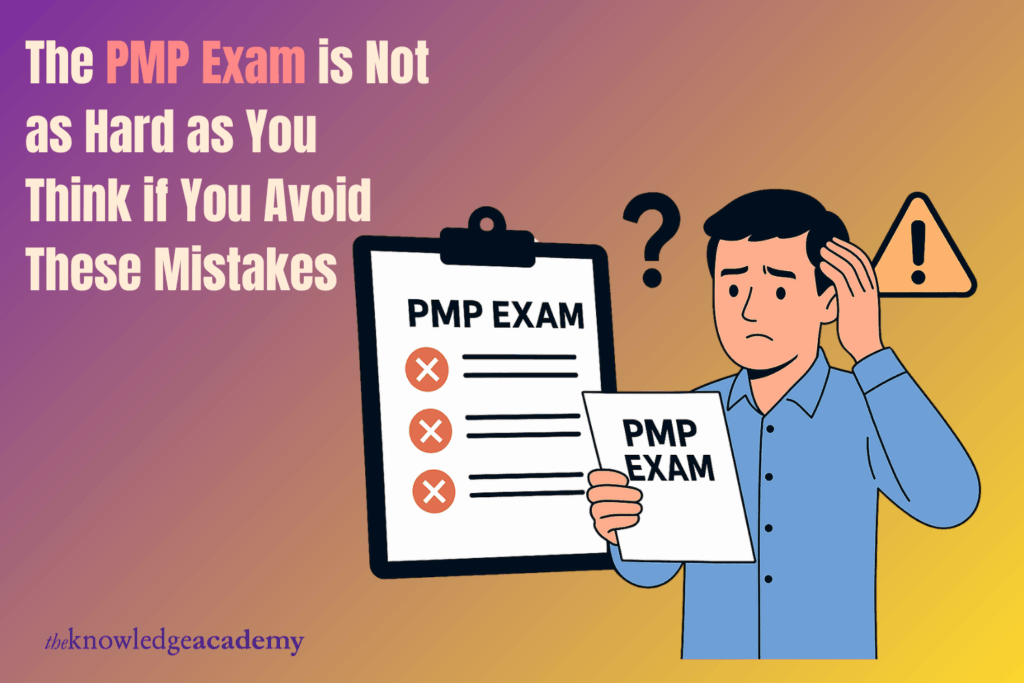Passing the PMP Certification is a goal many professionals set but often fear. You hear stories of how tough it is, how people fail, and how much time it takes. But the truth is, the PMP exam is not a beast if you know what to avoid. It is not about being perfect. It is about being smart. Ready to save yourself from the most common mistakes candidates make? Let’s take a closer look and simplify your path to success.

Contents
- 1 Avoid These Common Mistakes to Make Your PMP Journey Easier
- 1.1 Skipping the PMBOK Guide Entirely
- 1.2 Memorising Instead of Understanding
- 1.3 Ignoring Agile and Hybrid Approaches
- 1.4 Taking Too Many Mock Tests Without Review
- 1.5 Underestimating the Exam Format
- 1.6 Not Setting a Study Schedule
- 1.7 Relying on Just One Source of Study
- 1.8 Avoiding the Exam Out of Fear
- 1.9 Not Applying Lessons to Real Scenarios
- 2 Conclusion
Avoid These Common Mistakes to Make Your PMP Journey Easier
Success in the PMP exam often hinges on knowing what not to do. Below are the mistakes candidates make and how to sidestep them with confidence:
Skipping the PMBOK Guide Entirely
Many applicants think they can simply use summary notes or preparatory courses. It’s a mistake. The foundation of the PMP certification is the PMBOK Guide, which can be challenging to read. Although you do not have to commit every word to memory, you must comprehend its meaning and progression. Use it as a point of reference, particularly when attempting to understand the terminology and fundamental procedures.
Memorising Instead of Understanding
You won’t succeed if you try to memorise definitions and formulas. Your ability to apply principles in practical settings is tested on the PMP exam. This implies that you need to comprehend not only what is done but also why it is done. Concentrate on understanding how the various process groups and knowledge domains relate to one another.
Ignoring Agile and Hybrid Approaches
You won’t be ready if you just study traditional project management. Agile, hybrid, and predictive approaches are all part of the current PMP certification framework. Pay close attention to all three. These days, many questions combine these, so it’s crucial to practise scenario-based questions.
Taking Too Many Mock Tests Without Review
Mock exams are useful, but only if they help you study. It is a waste of time to complete ten practice tests without going over the answers. Take some time to review each mistake individually. Recognise the incorrect reasoning behind your response. This is how true progress is made.
Underestimating the Exam Format
The PMP exam is often thought of as a memory test. It’s not. The enquiries are situational. They put your leadership abilities, dispute resolution skills, and judgement to the test. Learn the format of the questions. Apply practical thinking. Select responses that emphasise stakeholder participation, ethical decision-making, and team leadership.
Not Setting a Study Schedule
“I’ll study when I have time” is rarely an effective approach. There must be a structured approach to the PMP certification process. Create a basic study schedule with weekly objectives to help you stay focused. Divide it up into subjects and process groups. Ten hours a day is not necessary. If you are consistent, even one dedicated hour a day can be effective.
Relying on Just One Source of Study
Not everything can be covered by a single video course or prep book. Blend your education. Join a study group, view videos, use flashcards, read the PMBOK Guide, and register in a course. Various viewpoints aid in your comprehension of the subject matter. Additionally, it keeps things interesting, which aids with retention.
Avoiding the Exam Out of Fear
Many people put off scheduling their exams because they don’t think they’re “ready enough.” However, the ideal time never arrives. Leap if you have studied the material, completed practice exams, and comprehended the ideas. Action breeds confidence. Excessive waiting only makes things worse.
Not Applying Lessons to Real Scenarios
Knowing the terms is one thing. Applying them is another matter. Consider your actual projects. In a difficult circumstance, how would you handle a stakeholder? How would you adjust to changes in scope? The application of sound judgment is the focus of the PMP certification. Develop the mindset of a project manager.
Conclusion
The PMP exam is not easy, but it is not as difficult as many make it sound. Avoiding these common mistakes will give you a clear edge. Preparation is more about mindset and smart strategy than brute memorisation. A certification in project management offered by The Knowledge Academy can assist in your PMP journey, making your preparation smoother and more focused.

